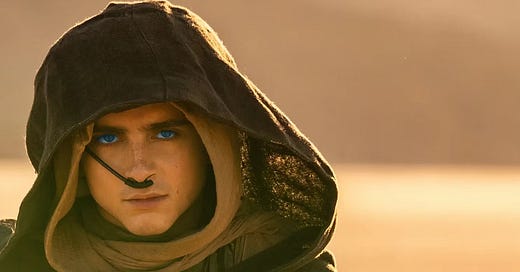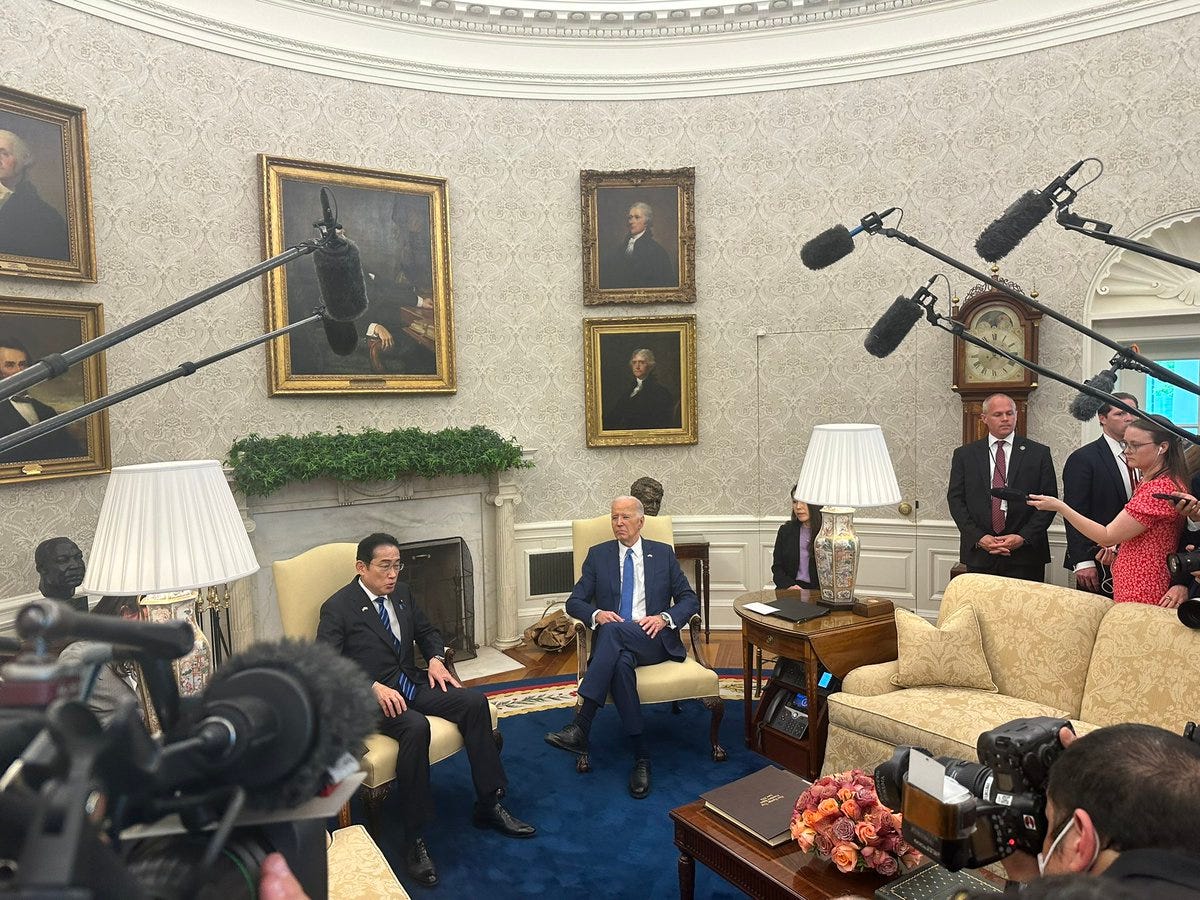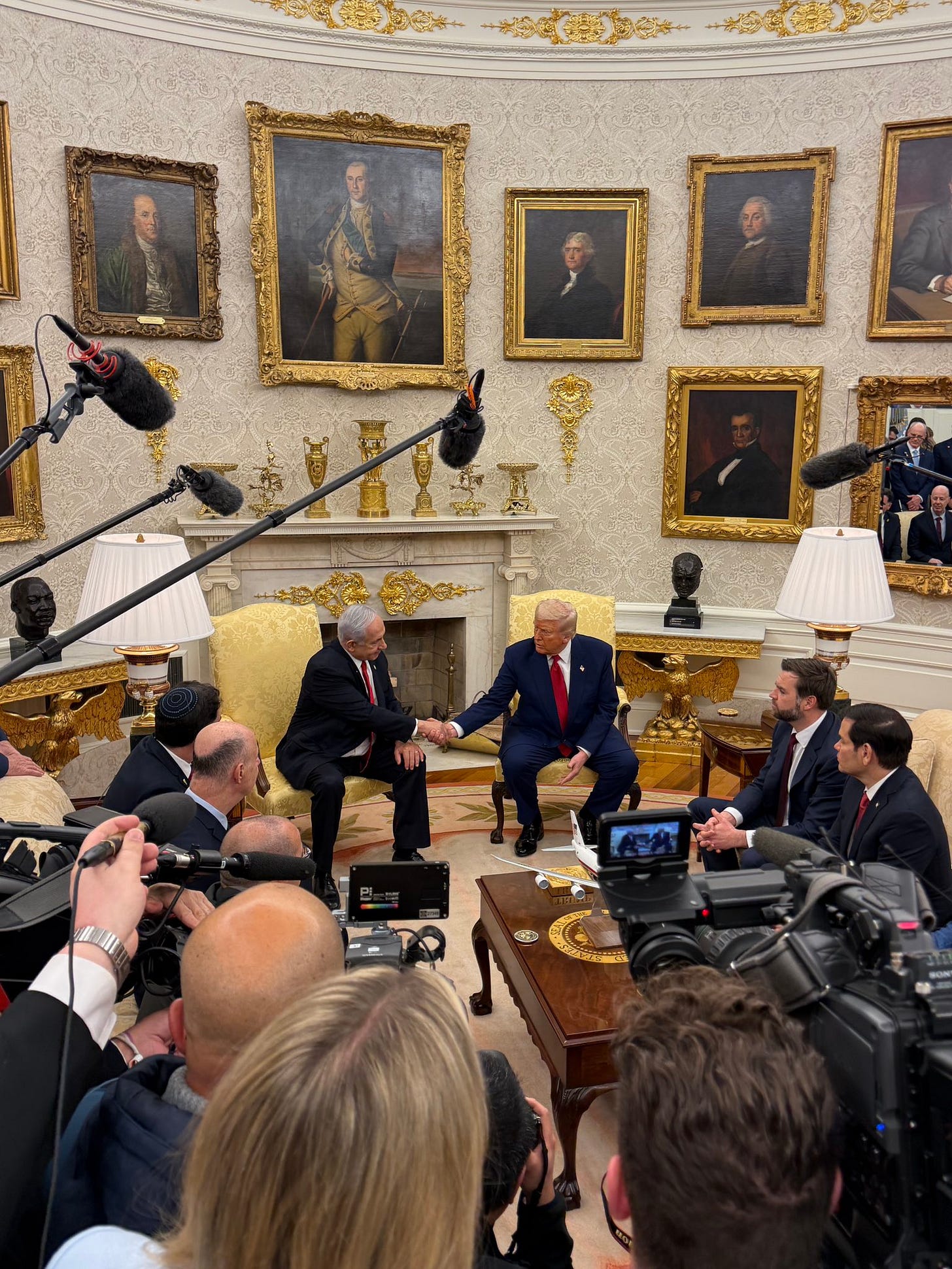The White Lotus as a Zionist Warning, Owen Jones as an IDF Soldier, Jackson Hinkle as the Lisan al Gaib, Gideon Levy as Diane Keaton as Louise Bryant, and Trump’s Pseudo-Democratic Golden Shitter
Bear with me...
Sunday night was the season finale of The White Lotus, Mike White’s epic murder-romance-class-struggle drama now spanning three different settings: Hawaii, Sicily, and Thailand. While the second season — the Italian soap opera rendition — still stands out as the strongest in my opinion, there were elements of this current season that I genuinely enjoyed. The chemistry between the three female friends — Laurie, Jaclyn, and Kate — was magnetic. I also loved the innocent yet deplorable demon-twink energy of Lochlan Ratliff, and of course, his pill-popping mother Victoria (Parker Posey), who’s prescribed the same medication I’ve been taking since high school to treat my relentless insomnia.
At first, I felt self-conscious about this plot point. I worried that my own anxiety struggles (yes, Jonathan Haidt, my smartphone is partially to blame) were being mocked. But by the end, I came to appreciate it — especially since the name of the medication now strikes so many people as hilarious when said in an exaggerated Southern accent.
But one part of last night’s finale stood out to me — and not just to me — and that was when Victoria’s daughter, Lochlan’s sister, Piper Ratliff, comes to a devastating realization. Despite her moody musings throughout the season about wanting more from life than the grotesque privilege she was raised in, her dream of spending a year meditating in a Thai monastery just isn’t realistic.
Earlier in the season, Piper wrestles with how to break the news to her parents that she wants to drop out of society for a year. When she finally does, she’s met with hostility from Victoria, who insists she spend a night with the ascetic monks to see if she can actually handle it. Spoiler: she can’t. The food isn’t organic. The mattress has stains. There’s no air conditioning.
And here’s how Victoria responds...
There’s something just so... delicious about Parker Posey’s performance in this scene. She radiates satisfaction — the smug thrill of having her worldview validated: that wealth is not just comfortable, but supreme, and any attempt to step outside of it is not only misguided but borderline suicidal. And Piper plays it beautifully, too. You can see the anguish in her eyes — the ache of someone who genuinely longs to break free, but ultimately can’t let go of a lifestyle more lavish than that of “the old kings and queens.” In the end, though, that inner pain is more bearable than the trauma of actually leaving the aristocracy behind.
The irony, of course, is that it is all for nothing. Piper’s father, Timothy, is heading to prison for money laundering and tax evasion. The Ratliffs will soon lose their empire, Schitt’s Creek-style. The guillotine beckons. And Piper, when the blade finally drops — presumably minutes after the season ends — will regret not having escaped on her own terms. Because there’s power in that. There’s confidence. There’s self-actualization.
Which brings me to Israel.
Last week, I tweeted something that got me into a lot of trouble. (If you know what I’m referring to, don’t waste your breath telling me it was unnecessary or mean — I’ve already been reprimanded by the appropriate authorities.) The tweet took aim at a particular phenomenon in the Jewish world since October 7th: American-based influencers confidently recommending their preferred policies for the war.
Now, you might be thinking — Blake, you moved to Israel less than three years ago. What right do you have to tell Jews living abroad, who care deeply about the Jewish state, to hold their tongues when it comes to the intricacies of the conflict? Weren’t you in the same position just a few years ago?
And you might be right. (Though, to be fair, I wasn’t exactly dictating policy before I made Aliyah.) Maybe I haven’t lived here long enough, or experienced enough of Israel, to start gatekeeping like this. Then again, just a few hours before writing this, I finally got my draft date — I’ll be heading into the IDF in a few months. So take that for what it’s worth.
But I can only tell you, my loyal readers, what I feel. And what I feel — deeply — is this: you don’t know what it’s like here unless you live here. And no — visiting, while appreciated (and visiting frequently is certainly more than most do), is not the same thing.
Because visits, especially after October 7th, are something like a short swim through trauma and joy. You tour the south, the kibbutzim ravaged by Hamas. Maybe you visit Druze or Christian communities up north. You have a fun night out in Tel Aviv, a spiritual moment in Jerusalem, you spend a few hours volunteering — and then you go home.
But that isn’t what it means to live in Israel. That isn’t what it feels like to stay.
To live in Israel — especially over the last eighteen months — means waking up each day (if you were lucky enough to make it through the night without a 4 a.m. missile from Yemen) in a world that doesn’t make sense. It means checking your phone not just for the news, but for updates on where your children are, where your parents are, where your friends are — and where their children are.
It is the thrilling and the terrifying: the protests in the streets, the headlines from the front, the international diplomacy that suddenly feels personal. And it is also the absurdly mundane: doing your taxes, your laundry, your dishes — all while acutely aware that the speck of dust you call home is the most consequential, contested piece of real estate on Earth. Embedded in its soil are the deepest questions we ask as human beings: about identity, religion, history, the future, warfare, peace, and morality.
It is nothing like living in the United States. That much, I know from experience.
Now, to this contention, someone might say: Oh Blake, you’re not like most Israelis. Most Israelis aren’t walking around Tel Aviv pretentiously contemplating the fate of Jewish nationalism every day. Most people are working their jobs, raising their families, trying to live normal lives. There are Jews in the Diaspora who care more passionately about Israel than most Israelis ever will.
But I think that misses the point.
I can’t be certain, of course. But I do interact with those so-called “everyday Israelis” — every day. And there is a difference. A difference in how they move through life, how they carry the weight of things, even if they’re not glued to the news cycle or embroiled in constant ideological debate. Because even in the mundane here, there’s a kind of oxygen — the subtle, ever-present awareness of being part of something exceptional. Maybe even something chosen.
I know I’m not explaining this perfectly. But I can tell you this much: it’s not some romantic delusion I’ve conjured up about the Zionist project. It’s real. I know it’s real because I’m not here posting videos of myself in bomb shelters hoping to rack up sympathy and likes. I’m certainly not uploading staged beach photos of Muslim women with captions like: “WHAT APARTHEID? LOOK, WE ALL CO-EXIST PERFECTLY!” (Please — for the love of God — stop doing that.) I’m instead talking to you about the quotidian routine.
What I contend is this: you don’t know Israel until you know boring Israel. And you don’t know boring Israel until you start to notice something different — something you can’t quite name — pulsing beneath the boring.
Not on a mission trip. Not on a week-long excursion. Not on someone else’s dime.
But in ordering a coffee — with fucking chest pains that won’t go away, because ever since October 7th, even the sound of a dog barking can throw your nervous system out of whack for the rest of the day.
In killing a cockroach ( I had to kill three yesterday)— something that never used to make you cry — but now feels like the world is conspiring to overwhelm you, to curse you with one more moment of fragility you didn’t ask for.
In seeing a friend on the street, and collapsing into their arms, because your other friend just got called into Gaza — for the third time.
And this is where we return to The White Lotus finale — to Piper and Victoria Ratliff. Because while technically, anyone can make Aliyah and live in Israel… everyone can’t. In that sense, it’s not unlike the American Dream.
I’ve seen people like me — and many of my friends — who tried, and succeeded. And I’ve seen people who tried — really tried — and failed. Because it’s expensive. Because their parents and grandparents aren’t here. Because the sirens are terrifying.
But mainly — and I can’t stress this enough — because even the boring here is overwhelming. Because, without going full cliché, Israel simply is. It’s like a Buddhist monastery in that way: vibrating with meaning, intensity, and contradiction at every hour of the day. And that’s not easy to live inside of. Believe me, I have my days.
So please, American Jews — with all the love and respect in the world — keep your opinions about our politics to yourselves.
Yes, I lean left. But this isn’t about left or right. Please keep your anti-occupation rhetoric to yourself — no matter how much I might agree with it. And keep your “we’re going to take all of Gaza back” bravado to yourself, too. Keep your condemnations of protests in Tel Aviv — protests you call “divisive” or “a gift to the enemy” — to yourself.
We need your support, true, but once you start weighing in on the nitty-gritty of daily life here, you risk becoming Piper Ratliff: someone who can pontificate, but not participate. Someone who can talk, but not walk.
And maybe you have good reasons not to walk — your family, your job, your health. That’s fair. But it doesn’t grant you a green light to insert yourself into debates that tear at the very fabric of Israeli civil society.
I say this with humility — and with some introspection and self-criticism, too. When I leave the army, my commentary — of this kind — will be in Hebrew. Only in Hebrew. And when my Hebrew comes as naturally to me as English — and I’m determined that day will come — it will bring with it even more power, confidence, and self-actualization. The kind Piper wanted. The kind that goes beyond what I’ve already gained simply by “making it” in this batshit crazy place, and refusing — come what may — to retreat back into a bubble of privilege and comfort.I suppose the only exception to this argument is if someone outside the land has genuinely earned the title of a foreign policy expert. If they work at a think tank. If they hold a position on Capitol Hill. If they’ve stood face-to-face with Israeli power-brokers and leveraged real influence. But for the vast majority of the people I’m currently subtweeting — that is not the case. I take it you know who I’m speaking of.
You are not Thomas Friedman.
You are Piper Ratliff.
With peace and love.
Kob Kun Ka.
Other stuff
Famed shit weasel Owen Jones was recently asked to leave Buttmitzvah, a queer Jewish party based in the UK, and reading his response to this grave oppression — along with the reactions from even more militant antisemites online — gave me one of the best afternoons of my life. Seriously — no notes. It seems that to the Dorito brigade (my term for those who proudly brandish the red triangle in their Twitter handles to signal support for Hamas), Owen Jones — simply because he wanted to do drugs and dance with shirtless Jewish men (and honestly, who among us…) is now officially part of the enemy guard. Sorry, Owen, not even a hundred interviews with “the far-right’s worst nightmare” Judith Butler can save you now.
Ha’aretz’s most notorious Israel hater Gideon Levy had to write a public apology for appearing on Jackson Hinkle’s podcast — yes, that Jackson Hinkle, Nazi propaganda enthusiast, who a week before, had taken the stage in Yemen to give a speech of solidarity with the Houthis and the larger “Axis of Resistance.” The first thing my mind went to upon seeing this footage was Timothée Chalamet as Paul Atreides in Dune: an outsider, who comes to the exotic, anti-imperialist world of the Fremen to become their (ultimately false) Messiah and savior, the Lisan al-Gaib.
That certainly seems to be the role Jackson Hinkle imagines for himself in Yemen — if only in his own eyes. In stark contrast to the Fremen of Arrakis in Dune, I doubt there are many Yemenis eager to follow a former Bernie Bro turned meme-lord into battle. But maybe I’m wrong.
Another image that immediately came to mind watching Hinkle take the stage in Yemen was, of course, Warren Beatty as communist journalist Jack Reed in the greatest movie ever made, Reds (1981). Now, I’m not comparing Jackson Hinkle’s intelligence — or lack thereof — to the real-life intellect of Jack Reed. But there was something uncannily similar in the image of Hinkle leading chants of “Revolution!” to the scene in Reds where Jack Reed, having just arrived in 1917 Petrograd as a journalist, crosses the line into activist, into revolutionary. Like Timothée Chalamet in Dune, here was another outsider — in this case, a privileged Westerner — finding meaning, purpose, and no small amount of adolescent joy in the Freudian murder of the father figure.
Which, of course, casts Gideon Levy (who — believably or not — claimed he had no idea who Jackson Hinkle was before agreeing to appear on his podcast, only impressed by his follower count) in the role of Diane Keaton’s Louise Bryant. In Reds, Bryant accompanies Jack Reed to Russia, entranced — despite herself — by his star power, by his reckless commitment to revolution. In the famous scene where Reed “crosses the line” in Petrograd, leading a workers’ march, you catch a glimpse of awe in her eyes — but also fear, hesitation, maybe even regret at having been drawn into his extremity.
After the revolution, and after Reed’s death, Louise Bryant became disillusioned with Bolshevism. She returned to America, married a wealthy diplomat, and eventually settled into the comfortable, ironic fate of many former radicals: drinking wine in the bourgeois art salons of Paris.
Though she never fully renounced her leftist politics, Bryant had to confront the reality that she was only ever relevant in the public eye so long as she was tethered to Jack Reed — to the firebrand, to the revolution itself.
I suspect Gideon Levy will arrive at a similar realization sooner rather than later — much as Owen Jones is now discovering that even attending a queer Jewish party is “liberal Zionism” in the eyes of the hardliners. Gideon Levy is only relevant so long as dyed-in-the-wool antisemites can cite his columns in Haaretz. Without them, he’s just another journalist at the party — drink in hand, looking for someone to listen.
And Piper Ratliff? Without her fantasy of renunciation — without the dream of casting off privilege for something higher — she’s not a rebel or an ascetic. She’s just another rich girl on a yacht, seeking what a professor of South Asian studies recently described as Thailand’s primary export in The White Lotus: a “spiritual carwash.”
But that’s not unique to Piper. It’s the same longing that sent Jack Reed to Petrograd, and Jackson Hinkle to Yemen — the fantasy of washing oneself clean in the waters of revolution, struggle, or faith. Always glamorous. Always elsewhere.
Finally, after President Trump’s meeting with Prime Minister Netanyahu in the Oval Office this week, a sharp-eyed observer on Twitter pointed out just how different the room looks compared to its appearance during the Biden Administration — particularly how many gold accents have been added.
Now, a traditional liberal might scoff at this development in White House decor. They might ask themselves: How is it possible that the everyday American could idolize this man — a man so flagrantly tasteless in his preference for garish ornaments — whose aesthetic choices so clearly betray an obsession with wealth, status, and frivolity?
But I would argue it is precisely this characteristic of Donald Trump that makes him so appealing to the American working class — to the very people profiled by preeminent “Trump lefty” Batya Ungar-Sargon in her latest book Second Class: How the Elites (ah yes, the ever-present, definitely-not-a-scare-word 'elites') Betrayed America’s Working Class.
Fran Lebowitz, in a single devastating sentence, once captured America’s fascination with Trump: “He is a poor man’s idea of a rich man.” This is the paradox at the heart of Trump’s appeal. In America, wealth is an ideal — it is celebrated, coveted, endlessly justified, even beloved. But class is not.
Class — which may stem from money but is not synonymous with it — includes things like where one went to school, what books one has read, one’s aesthetic tastes. It reflects the classic “old money vs. new money” divide: on the one hand, the discreet mansion at the end of a long, tree-lined driveway; on the other, annoying Instagram pictures of one’s vacation to Mexico, and well, Trump Tower — a skyscraper emblazoned with its owner’s name in gold block letters, screaming for attention from the streets below.
Class is also, increasingly, a matter of politics — of how one speaks, what one says about social issues, how one navigates civil society. It signals not just wealth, but belonging — to a particular cultural caste that knows how not to look like they care about money, even (or especially) when they have it. Trump has never belonged to that world. And he knows his supporters don’t either.
A rich man has an Apple Watch — and agrees that immigration is an imminent threat to Western civilization, that “MEN IN WOMEN’S SPORTS!” signals the downfall of the American way of life.
A man with class — not merely wealth — wears the same Apple Watch, but his concerns are different. He worries about domestic rule of law, the integrity of democratic institutions, the war in Ukraine. And in doing so, he renders himself — and his Apple Watch — a grotesque display of “elitism.”
It’s a distinction that cuts to the heart of the contemporary American culture war. The Apple Watch is the same. The money might be the same. But the signals — the language, the enemies, the priorities — are worlds apart.
And of course, in the populist framing advanced by someone like Batya Ungar-Sargon — who rarely appears on television these days without a large Star of David necklace — “elitism” is a term that, regardless, to a certain swath of the population, will always remain linguistically connected to an accusation against the Jews. No amount of populist rebranding can fully erase that undertone. It’s part of the semiotic architecture of the culture war — unavoidable, even (or especially) when unsaid.
Donald Trump’s redecoration of the Oval Office isn’t all that different from the way he styled his penthouse in Trump Tower: golden curtains, golden chandeliers, golden faucets — even a golden toilet.
To those who prize the aesthetic of class over mere wealth, this is cause for instant revulsion. The markers of taste — restraint, subtlety, minimalism — are nowhere to be found. But to a minimum wage worker, or to anyone alienated from the codes of elite culture, there is something undeniably appealing about this shameless gaudiness.
It does not exclude you — even though Trump, like Victoria Ratliff, delights in “living better than even the old kings and queens.”
As Natalie Wynn (ContraPoints) explains in her seminal video Opulence:
“Trump behaves like a prole(tariat) who won the lottery. So there’s actually something kind of relatable, un-snobbish, and even pseudo-democratic about the golden faucets. People who have wealth, but not class, are actually very popular in this country. We don’t like class, because class is exclusionary. Whereas anyone can acquire wealth, we tell ourselves, so wealth feels potentially inclusive of everyone — even though in reality, it isn’t.”
And there may be no one alive more committed — whether by instinct or policy — to making sure that wealth remains exclusive than Donald Trump.
That’s all from me this week, comrades. May your toilets be golden, your Apple Watches gauche, and your politics slightly less embarrassing.









Really great piece, Blake, as always. As a onetime Israeli (and still a citizen) who’s heard all manner of extreme opinions from folks here in North America, agree that it would be great if those not actually in the middle of it all listen more and opine less.
You can't know how it is to be Palestinian, you would have to live in Gaza. I invite you to so you experience the dehumanization by yourself. Can't believe the entitlement of people celebrating enrolling in a murderous army (although this is redundant).